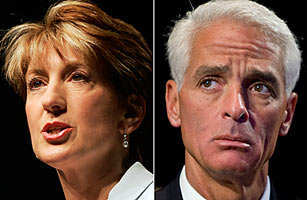
"Moderates? Let me see ... Let me count," Maine Senator Olympia Snowe, one of three remaining New England Republicans in Congress, says with a laugh when asked if GOP moderates are dying off as much from friendly fire as from Democratic challenges. "I hope it's not the case," she says. "The only way for us to be a majority party is to be inclusive, and people are going to have to have that understanding in order to return to a majority status."
Majority status was the last thing on conservative Doug Hoffman's mind when he challenged Dede Scozzafava, the moderate Republican picked by the New York State GOP to run in a special election in New York's 23rd congressional district. Hoffman's challenge, supported by the New York Conservative Party and former vice-presidential nominee Sarah Palin, sparked a civil war in a district held by the GOP since 1872. With polls showing Hoffman surging going into the weekend, Scozzafava withdrew in a huff and endorsed Democrat Bill Owens. Owens won, with 49% of the vote to Hoffman's 45%. Scozzafava, who remained on the ballot, drew 6%.
Democrats have pointed to the episode as an example of the identity crisis the Republican Party seems mired in. And certainly, Hoffman is not alone. In fact, in the Senate there's only one GOP recruit that isn't facing a primary challenge: Representative Mike Castle of Delaware. Even the 2008 Republican presidential nominee John McCain has three probable primary challengers — though he's so secure in his seat, he didn't make this list. In the House it's worse: dozens of incumbents or candidates backed by the party are being challenged. And there looks to be at least nine nasty Republican gubernatorial primaries. Already the repercussions of New York's 23rd are being felt: Senator John Cornyn, a Texas Republican who heads the National Republican Senatorial Committee, which works to elect Republicans to the Senate, has said he will stop helping candidates he's recruited — many of whom are conservative targets — if they're being challenged to primary fights.
Here's a look at 10 races in which Republicans are watching their backs.